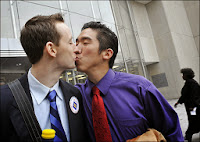A Weird World: Both Sides See Same-Sex Marriage as Winning Issue
The economy is king in 2012 politics, but in a close election, the issue of same-sex marriage could make a difference.
With New York recently legalizing gay marriage, the Pentagon processing the repeal of "don't ask, don't tell," and Congress battling over the Defense of Marriage Act, gay rights have gotten a lot of media attention, and activists on both sides of the argument believe they have a politically potent issue.
Voters who strongly support or strongly oppose same-sex marriage will likely be more apt to get out and vote next year and inspire others to do the same, particularly since several key states are already embroiled in the debate, with battleground state Minnesota adding a gay marriage ban vote to the state's 2012 ballot, and Colorado, another swing state, close to adding a vote to repeal its marriage ban to the ballot, if advocates gather enough signatures. "Clearly the overriding issue in the next election is going to be the economy and jobs," says Brian Darling, a senior fellow for government studies at the conservative Heritage Foundation. But when votes get close, he says, "issues like traditional marriage can make a critical difference in an election and may be a deciding factor."
After the 2004 election, when voters in 11 states adopted same-sex marriage bans, the New York Times reported that socially conservative voters who came out primarily to vote against gay marriage may have tipped the scales in favor of former President George W. Bush. Since presidential elections have been consistently close in the past six cycles—popular vote in every election since 1988 has been within nine percentage points—voters on either side of the issue could tip the scales. [Check out a roundup of political cartoons on gay marriage.]
Public opinion and the political landscape have changed on gay marriage since 2004, and both continue to shift. President Obama has not supported gay marriage publicly, and has said his views on the issue are "evolving," though gay marriage advocates and opponents both assume he supports it privately, particularly based on his support for repealing Defense of Marriage Act, which defines marriage as being between a man and a woman and permits states to not recognize same-sex marriages performed in other states. And a recent Gallup poll suggests, for the first time, a majority of Americans, or 53 percent, support legalizing it, compared to 27 percent when the Defense of Marriage Act passed in 1996. Younger Americans are leading this change: 70 percent of 18-to-34-year-olds think gay marriage should be legal, compared to 54 percent of the same age group in 2010, according to the poll.
Gay marriage advocates believe this means the issue has reached a tipping point and thatRepublican candidates who are outspoken against gay marriage will face trouble in the general election. "In the past, Democrats supported gay rights but weren't that excited about talking about it," says Richard Socarides, former Clinton adviser and president of Equality Matters, which works for equal rights for lesbian, gay, bisexual, and transgender people. "And Republicans used gayrights issues as a way to energize right-wing base voters." 2012, he says, will be different, "because the Democrats will be using their support for gay rights as an issue to excite their own base, as an issue to generate enthusiasm around Democratic swing voters."


Comments